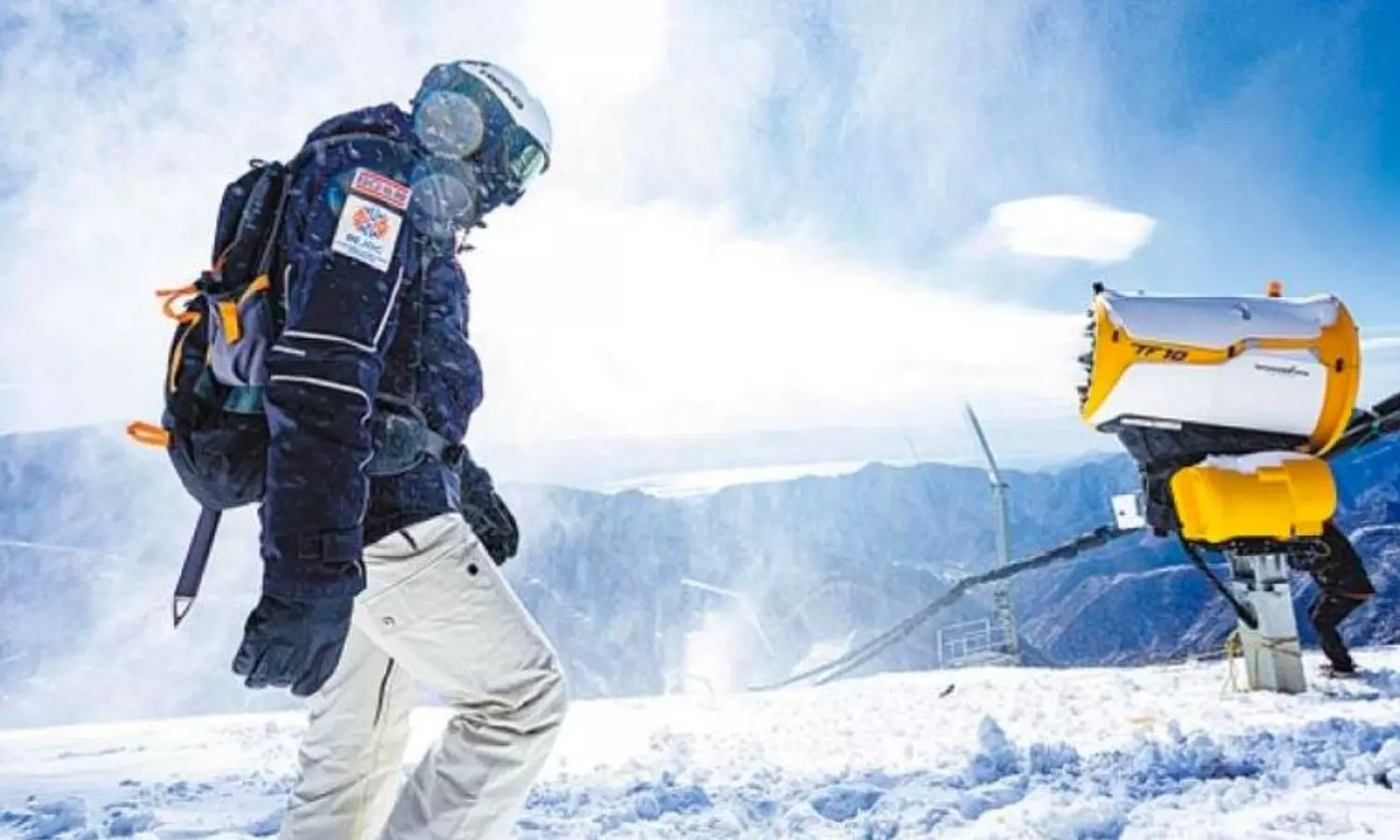Olympics
'The Fake Olympics': Did you know China will use fake snow for Winter Olympics?
China resorts to 'fake it till you make it' snowmaking techniques to solve the dilemma of snow being a no-show at the upcoming Winter Olympic Games in February.

Snow guns being used to spray 'fake snow' for the 2022 Winter Olympics (Source: Tao Ran/China Daily)
Imagine getting the chance to host a grand theme party and realizing soon enough that you are missing the key ingredient for it. Well, the party, in this case, is none other than the upcoming 2022 Beijing Winter Olympics, and the key ingredient that China misses dearly is some real snow to make it perfectly wintry.
Yes, you read that right. Welcome to the first-ever Winter Olympics where...wait for it...there will be no real snow!
If you thought it's only the stuff of the silver screen that is in the business of make-belief, you do need to think again, because the Beijing Winter Olympics is all set to host the Winter Games using fake, artificial snow that is being tirelessly sprayed onto the mountains of Zhangjiakou in China before the world's best skiers and snowboarders cruise down the slopes of the Chinese version of man-made Alps come February 4th.
Creating the perfect set design, the Beijing Winter Olympics is being draped in sheets of artificial snow powered by complex technology, as China gets ready to host the Games in one of the driest regions of the country.
Wanlong Ski Resort in Zhangjiakou (Source: Bloomberg)
If you find yourself excited at the idea of snow sprays, it is China where we should be looking for inspiration as they did take the matter of snow-making quite seriously. Climate change being the latest evil has wonderfully slashed the list of host countries that receive ample natural snowfall to host an event the large-scale as that of an Olympics - making artificial snow a part and parcel of the Games since the 1980 New York Olympics.
Artificial or 'fake' snow, be it as it may, has always been used in varying proportions in the recent Games. Surprisingly enough, about 80% of the snow at the 2014 Sochi Games in Russia, was also manufactured. Four years later, at the Pyeongchang Games in South Korea, that contribution spiked to 90%, and given the geometric progression of this occurrence, it comes as little surprise that the Beijing Olympics will be the first Games in history to use 100% artificial snow.
'We can hold the Winter Olympics on the Moon or on Mars'
In its earnest effort to resolve the dilemma of snow being a no-show at the Beijing Olympics, the organizers of the Games invested heavily in Zhangjiakou's tourism industry since Beijing won its bid for the Winter Olympic Games in 2015 and now it even has 7 sprawling ski resorts. However, the use of artificial snow may not be the most environmentally-wise thing to do and is a huge cause of concern as Zhangjiakou is a 'highly water stressed' region.
With the help of reservoir water, around 300 yellow turbines called 'snow guns' are being used to spray water mixed with compressed air to form snow thanks to the freezing temperatures and chemicals present that help it to be converted into ice. With barely a few weeks left before the Games begin, China is leaving no sheet, er of ice unturned to ensure that Zhangjiakou transforms into the Winter Wonderland perfect for hosting the Olympics.
But amidst all this snow-making business, the environmental toll that this could lead to is of concern and many critics have called out China for not sticking to the norms of hosting a truly 'green' and sustainable Olympics. It is estimated by Carmen de Jong, a geography professor at the French University of Strasbourg that China could need as much as 2 million cubic meters of water — enough to fill 800 Olympic-sized swimming pools — to create enough fake snow to cover ski slopes and access roads during the Games.
With technology like that up the sleeve of the Chinese, de Jong felt, "We could just as well hold the Olympics on the Moon or on Mars," she stated to the AFP.
The 'fake it till you make it' policy
While China may be the first to host both the Games - the Summer and the Winter, it is also the first to 'simulate' the sense of winter when it hosts the Games on man-made snow. However, it is no longer a secret that snowy resorts in Europe and North America, make use of artificial snow that has emerged as a more efficient and reliable alternative to natural snow to build and design competition courses for almost all skiing and snowboarding disciplines.
Eliminating the natural factor and introducing the fake bit to it, the use of man-made snow also gives control over how a track will take shape. At the Beijing Olympics as well, organizers are absolutely strict about maintaining the quality of the snow to ensure that it is uniform and does not have any unevenness that could lead to accidents. In fact, after the snow is sprayed, truck-like automobiles called 'snowcats' are used to level out the pistes and sculpt the turns and jumps.
As far as the environmental concerns go, the organizers of the Beijing Olympics have mentioned that the snow-makers being used from an Italian company, TechnoAlpin, are powered by renewable energy and will not harm the mountain ecosystems. Meanwhile, the water they use will return to local reservoirs as the snow melts in spring - and therefore environmentalists do not need to stress.
If China does go on to successfully host the Beijing Winter Olympics without real snow, it will be a landmark event and will ensure that more countries, with the right resources to make snow, if not naturally produce it, will also have a chance to come play host to this grand quadrennial party that is the Winter Games.
